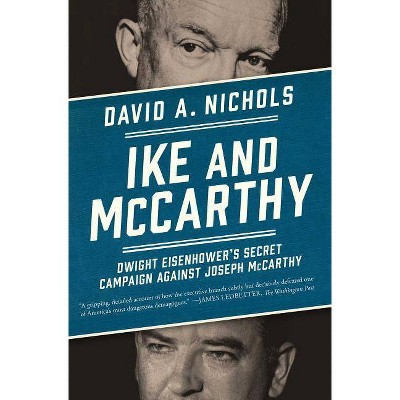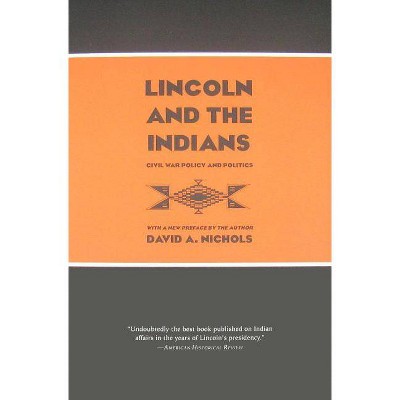Ike and McCarthy - by David A Nichols (Paperback)

Similar Products
Products of same category from the store
AllProduct info
<p/><br></br><p><b> About the Book </b></p></br></br>"In January 1954, Joseph McCarthy was one of the most powerful members of the United States Senate. By the end of that year he had been censured by his colleagues, and his power was shattered. Ike and McCarthy is the dramatic story of how President Dwight Eisenhower worked behind the scenes to make this happen. When Eisenhower took office in January 1953, anticommunist fervor was at a fever pitch. The loudest voice was McCarthy's, charging that the government was riddled with communist spies. Ike thought that McCarthy's accusations were dangerously irresponsible, but in 1953 he had other priorities, including ending the Korean War. Commentators and pundits blasted Eisenhower for not confronting McCarthy, but the president believed that challenging McCarthy directly would only enhance the senator's reputation. However, when McCarthy launched an investigation into communists in the Army, Eisenhower, who had spent most of his life as a soldier, knew he would not be exempt from McCarthy's attacks. David A. Nichols tells the riveting and little-known story of how Eisenhower and his advisers carefully plotted their successful effort to diminish McCarthy's influence. Eisenhower was not above exploiting personal information about McCarthy's chief counsel Roy Cohn's relationship with army private G. David Schine. When Ike learned that Cohn had repeatedly sought special privileges for Schine, the White House instigated an investigation into whether McCarthy had exercised improper influence on Schine's behalf. The resulting report by the army, which concealed the White House's role, ignited a political firestorm that resulted in the Army-McCarthy hearings. Those hearings, lasting two months, exposed McCarthy's tactics to the public through the new medium of television. That was McCarthy's downfall, covertly manipulated by Eisenhower and his closest advisers. While others played a part, Dwight Eisenhower's secret role in McCarthy's destruction is a seminal story in American political history. Nichols has drawn on thousands of McCarthy-related documents in the Eisenhower Presidential Library archives that Ike ordered a subordinate to collect, as well as other declassified documents, to tell this story of a classic Washington power struggle."--Jacket flaps.<p/><br></br><p><b> Book Synopsis </b></p></br></br><b>The full, little-known story of how President Dwight Eisenhower masterminded the downfall of the anti-Communist demagogue Senator Joseph McCarthy is "a gripping, detailed account of how the executive branch subtly but decisively defeated one of America's most dangerous demagogues" (<i>The Washington Post</i>).</b> <p/>They shook hands for the cameras, but Dwight Eisenhower privately abhorred Senator Joseph McCarthy, the powerful Republican senator notorious for his anti-Communist campaign. In spite of a public perception that Eisenhower was unwilling to challenge McCarthy, Ike believed that directly confronting the senator would diminish the presidency. Therefore, the president operated--more discreetly and effectively--with a "hidden hand." <p/>In "a thorough, well-written, and surprising picture of a man who was much more than a 'do-nothing' president" (<i>Kirkus Reviews</i>, starred review), David A. Nichols shows how the tension between the two men escalated. In a direct challenge to Eisenhower, McCarthy alleged that the US Army was harboring communists and launched an investigation. But the senator had unwittingly signed his own political death warrant. The White House employed surrogates to conduct a clandestine campaign against McCarthy and was not above using information about the private lives of McCarthy's aides as ammunition. <p/>By January 1954 McCarthy was arguably the most powerful member of the Senate. Yet at the end of that year, he had been censured by his colleagues for unbecoming conduct. Eisenhower's covert operation had discredited the senator months earlier, exploiting the controversy that resulted from the televised Army-McCarthy hearings. McCarthy would never recover his lost prestige. In <i>Ike and McCarthy</i>, Nichols uses documents previously unavailable or overlooked to authenticate the extraordinary story of Eisenhower's anti-McCarthy campaign. The result is "a well-researched and sturdily written account of what may be the most important such conflict in modern history....Americans have as much to learn today from Eisenhower as his many liberal critics did in 1954" (<i>The Atlantic Monthly</i>).<p/><br></br><p><b> Review Quotes </b></p></br></br><br>"A thorough and detailed look inside one of the classic battles in American politics. . . . Because of his public aloofness, many believed Eisenhower was politically naive. The original golfing president, Nichols shows in meticulous detail, was far from it."--Chris Foran "Milwaukee Journal Sentinel"<br><br>"A well-researched and sturdily written account of what may be the most important such conflict in modern history: the two years, 1953 and 1954, when Dwight D. Eisenhower, the first Republican president elected since Herbert Hoover, found himself under assault from the demagogic senator who perfected the politics of ideological slander. . . . Americans have as much to learn today from Eisenhower as his many liberal critics did in 1954."--Sam Tanenhaus "The Atlantic Monthly"<br><br>"Cleanly written and consistently judicious. . . . <i>Ike and McCarthy</i> shows how hard it was, and how long it took, for a president to rein in a single senator. It remains for the reader to discern in this book a rough, inverted image of our own time, with the polarity reversed between the White House and the Congress."--Thomas Mallon "The Wall Street Journal"<br><br>"Fascinating detail. . . . Nichols does an excellent job of conveying the fraught tenor of the times. . . . The lesson Nichols leaves us with in <i>Ike and McCarthy</i> is that truth tends to be undervalued as a political commodity, and as a result American democracy remains vulnerable to those who do not respect it." --Philip Seib "Dallas Morning News"<br><br>"New insight into Dwight Eisenhower's silent methods of facing down enemies, particularly Joseph McCarthy. . . . A thorough, well-written, and surprising picture of a man who was much more than a 'do-nothing' president."-- "Kirkus Reviews (starred review)"<br><br>"Nichols has provided a gripping, detailed account of how the executive branch subtly but decisively defeated one of America's most dangerous demagogues. In today's incendiary politics, the hidden hand is out of fashion. But the need to battle demagoguery is as topical as ever."--James Ledbetter "The Washington Post"<br><br>"Nichols shows how [Eisenhower's] quiet, effective crusade against a demagogue turned the nation away from a domestic threat. Heavily annotated with both primary and secondary sources, this day-to-day narrative is detailed and telling."-- "Library Journal (starred review)"<br><br>"Another first for David Nichols. His fresh insights based on exceptional research and his fluid writing make this book particularly interesting and enlightening. Nichols has broken new ground. The story of Ike's role in the downfall of McCarthy is finally told - and extremely well."--Chuck Hagel, former U.S. Secretary of Defense<br><br>"Dwight Eisenhower was a remarkable president. Peace in Korea, a reduction of Cold War tension, the interstate highway system, and the enforcement of desegregation in the South were all Ike's achievements. But he was also extremely effective acting under the surface. David Nichols captures his ability to get things done without revealing himself. The destruction of Joe McCarthy and McCarthyism is a perfect example. Ike handled it, the nation profited, and David Nichols has done a superb job of analyzing it."--Jean Edward Smith, author of Eisenhower in War and Peace<br><br>"Nobody has done more to debunk the myth that President Eisenhower was passive and ineffective than David Nichols. In his riveting account of how Ike took down the fearsome demagogue Joe McCarthy, Nichols shows how just how deceptively clever Eisenhower could be. Nichols is a first-class scholar who knows how to spin a fast-paced yarn."--Evan Thomas, author of Ike's Bluff and Being Nixon<br>
Price History
Cheapest price in the interval: 14.89 on October 28, 2021
Most expensive price in the interval: 17.99 on March 10, 2021
Price Archive shows prices from various stores, lets you see history and find the cheapest. There is no actual sale on the website. For all support, inquiry and suggestion messagescommunication@pricearchive.us




















